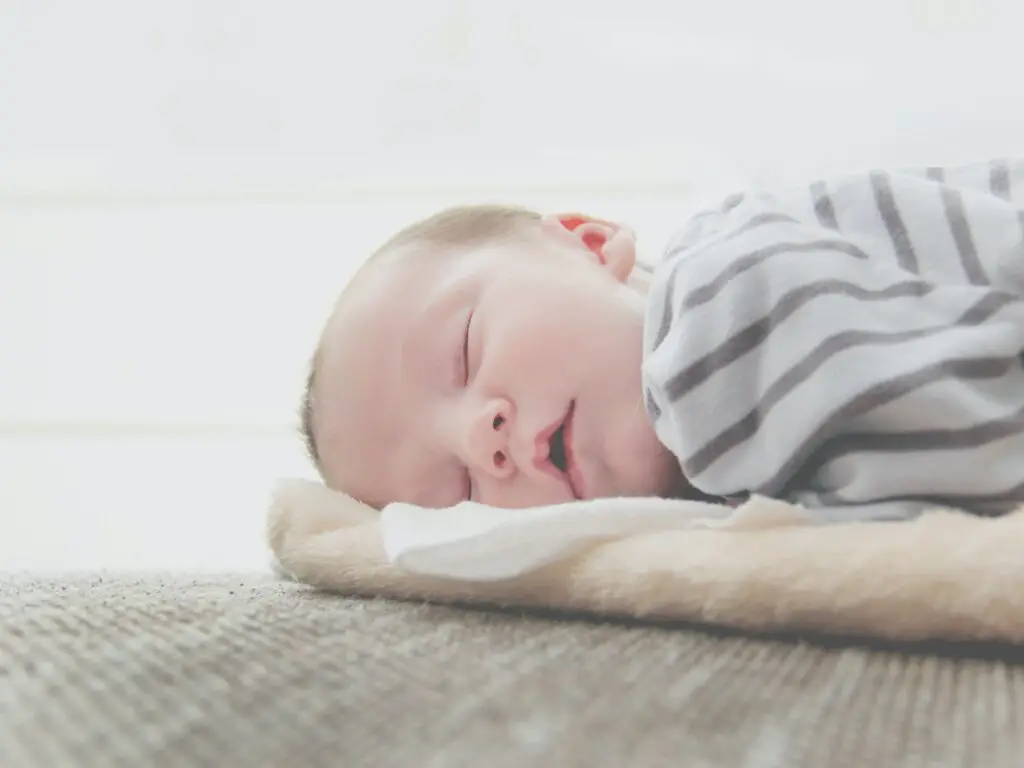Have you ever asked yourself “why do babies sleep with their mouths open?” Far from being a matter of laziness, this is a perfectly normal physiological phenomenon that scientists have studied for decades. While it may be unnerving to parents, there are several important and exciting reasons why a baby sleeps with its mouth open – so let’s take a closer look at what’s happening beneath these sometimes-mysterious eyelids!
Should One Be Concerned if Their Baby Sleeps With Their Mouth Open?
Concern over a baby sleeping with its mouth open is a common issue for many parents. It’s natural to worry when a child’s sleep patterns are different, but mouth-breathing while napping in babies is usually nothing to be concerned about. In fact, it’s something that only occurs occasionally, usually during intense sleep cycles or when lying on their back.
Suppose your baby’s mouth-breathing persists after they turn one year old. In that case, it may be time to consult a pediatrician, as persistent mouth breathing can sometimes indicate an underlying medical condition such as allergies or sinus infections. Ensuring your home is free of excess dust and other potential allergens can help prevent issues like this and ensure your baby sleeps well.
Read more: Why Do Babies Sleep With Their Butts In The Air?
Why Do Babies Sleep With Their Mouths Open?

Several potential explanations exist for why a baby might sleep with its mouth open. Here are some of them.
Allergies
Allergies are one of the most common reasons babies sleep with their mouths open. Babies have particularly delicate immune systems, making them especially susceptible to allergens in the air, including pollen and dust particles.
While adults can recognize such irritants and control their breathing response when exposed, babies lack this awareness and intuitive control, leading them to naturally breathe through their mouths more frequently than adults. Open-mouth sleeping helps keep babies’ airways unobstructed and maximizes oxygen intake during nighttime.
In addition to allergies, open-mouth sleeping can also be a sign of a baby’s genetic airway structure or specific health conditions like congestion from colds and respiratory infections.
Congestion
Although the sight of a baby with an open mouth looks quite adorable, there is a valid reason why they nearly always sleep this way. When a baby has a blocked and stuffy nose due to congestion it makes nose breathing difficult. Therefore, they cannot breathe properly through their nose and must rely on their mouth to draw in air.
Congestion occurs when the nasal tissue becomes inflamed and swollen, usually due to an infection or allergy. As this can cause discomfort or even pain for babies, many try to find relief by adjusting the position of their jaws and sleeping with their mouths open instead. This allows them to breathe more accessible by using larger airways made available from their mouths instead of the congested ones from the nose.
Read more: Why Do Babies Like To Sleep On Your Chest?
Colds
Colds are one of the potential facets of why babies sleep with their mouths open. This is because when babies have a cold, their nasal passages become stuffy, making it difficult to breathe through their noses. Therefore, to help them get air into their bodies, they open their mouths while sleeping on their bassinet to take bigger, deeper breaths.
This can establish better airflow in their lungs and reduce discomfort within the respiratory system due to an upper respiratory infection. Additionally, the coolness of the air entering their mouth as they breathe can temporarily relieve congestion or other cold-related symptoms.
Sleep Apnea
Pediatric obstructive sleep apnea is a common disorder that affects babies and adults, though it is more severe in adults. It is caused when the patient’s upper airway becomes partially blocked during sleep, interrupting their breathing repeatedly throughout the night and even causing them to stop breathing for short periods. For infants, sleep apnea can cause loud snoring and openings of their mouth during sleep, as the increased pressure from a blocked throat can be relieved by remaining open-mouthed.
Deviated Septum

A common cause of this phenomenon is a deviated septum, a condition in which the thin wall that separates the two nostrils is off-center or crooked. Due to the obstruction, the air has difficulty passing through the nose, which can lead to mouth breathing during sleep. The pressure in the ears and nose builds up and causes an uncomfortable sensation that many babies cannot express verbally.
Tongue-Tied
This occurs when the tongue’s flexibility is reduced due to the tissue underneath it, known as the frenulum, being too short or tight. When this happens, it can make it difficult for a baby to nurse on a bottle or breastfeed at the same level of comfort experienced by those without the condition. This is because it affects the tongue and mouth muscles. Depending on the extraneous tissue involved and the severity of its rigidity, tongue-tied may even interfere with activities such as speaking and swallowing.
What to Do if Baby Sleeps With Mouth Open
If your baby frequently sleeps with its mouth open, you may want to do the following:
Use An Air Filter
If your baby is sleeping with an open mouth due to allergies, it is essential to address the root cause of the problem. Investing in a good air filter for your home can help reduce pollutants and allergens that may be irritating. Additionally, it would help if you kept up with regular dusting and vacuum cleaning, as these activities can help remove any other particles floating in the air.
Use Nasal Drops

If your baby has a cold or other respiratory infection, using nasal drops or saline sprays can provide significant relief and make it easier for them to breathe through their noses while asleep. These products are designed to thin out mucus, making it easier for babies to expel secretions from their nostrils. Nasal drops are usually safe for babies and can help reduce the discomfort associated with blocked nasal passages.
Humidifier
If your baby’s nose is unable to breathe correctly, use a humidifier in their room to increase air moisture levels. This can make it easier for them to breathe and will also keep their nasal passages from becoming too dry or irritated. Additionally, you should avoid using fans in the room as this may worsen the situation by further drying out the air.
Consult With a Pediatrician
You must consult a pediatrician if you notice the mouth breathing of your baby as this could indicate an underlying health issue that requires medical attention. Your doctor can provide more insight into potential causes of sleep apnea in babies
If your baby frequently sleeps on their bassinet with its mouth open, you may want to consult a physician who can assess the underlying issue.
Conclusion
If your baby regularly sleeps with its mouth open, it’s essential to identify and remedy the underlying issue. This will ensure that they get a good night’s sleep without suffering from potentially serious health issues resulting from breathing difficulties. Taking the above measures can significantly improve their quality of life and help them lead a more comfortable life.














